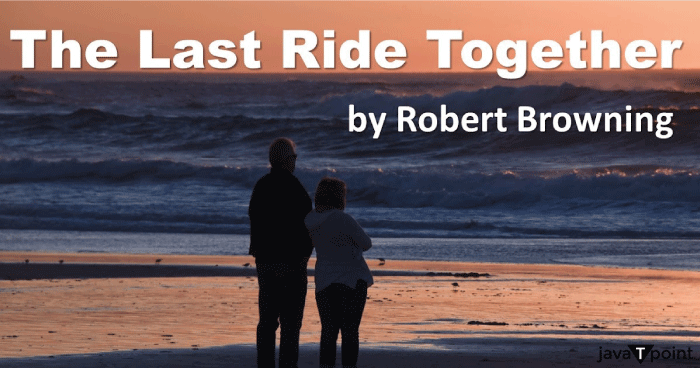The Last Ride Together SummaryThe Last Ride Together is a poem writen by the renowned poet Robert Browning first produced in the collection Men and Women 1855. The Last Ride Together comprises 10 stanzas and is dominated by genres like love and loss. The poem is in the monologue form that reflects the apparent emotion and feelings of the rejected lover whose affair will end. The poem's title shows their activity just before they broke up their affairs. The poet wants to express his gratitude and satisfaction towards his lover for the time she had given to him and wants to cherish and appreciate those memorable moments. The poem also has some sense of optimism and balances the feeling of love, sadness, and bitterness. 
Summary of the PoemIn the First Stanza, the speaker accused his fate for the culmination of his romance. He mourned as he took all his effort to save his affair, but the culmination of his lover's affair seemed very obvious. Despite having a setback, he has expressed his appreciation, love, and gratitude for the moment he had made with the woman and blessed her name. He requests the memory that he had with her beloved to be preserved and cherished and makes an appeal for the last ride before they part ways. The poem's second stanza stresses the women's reaction as she surveys him with pride tempered with pity. The speaker equated her answer with life or death, ultimately underscoring the stakes at play when it is a matter of love and passion. Ultimately, she said yes, and the couple had their final ride before departing. The third stanza emphasizes the blissful moment attached to the ride. The narrator is extra emotional this time and stresses nature's beauty; he is captivated by his surroundings, fuelled by his passion, and overwhelmed by the ecstatic sensation when The poem's Fourth stanza talks about Browning's thoughts on the passing nature of life. The speaker had decided to come out from their past actions and sought to make his future spectacular and beautiful. He emphasizes that it would become pointless to speculate about the past, and it has no meaning. Things could have turned out awful or pleasant; he focused on enjoying and preserving the moment. The fifth stanza of the poem continues the theme of the fourth stanza by making an equation with other men who have tried to get another thing and those who have been unsuccessful. After his death, he accepted his defeat and hoped for a wonderful and pleasant future in heaven. The poem's Sixth stanza deliberates the philosophy that a life devoted to contemplating love is more prosperous than any satisfaction that material wealth can offer. The stanza employs several analogies and allusions to prove his point, for example, equating life's biggest joys to the crown one can achieve. It also brings equations between the life of several other people, such as a soldier, a statesman, and a lover. In the end, the speaker concludes that a lover's life is paramount. In the seventh and eighth stanzas of the poem, comparisons have been drawn from the love of a great poet and a sculptor. The speaker exudes the talent of these artisans. For example, the poet's works create rhyme and rhythm and while the Sculptor gives most of their life to carving out marvelous things from something. He later did this with composers also, stringing notes together. He equated these arts to the years of life he devoted to his beloved, trying to construct something magnificent from the union. In the ninth stanza, the narrator is surprised by what the future has stored for him and admits that he is clueless about what would have happened if they had stayed together. He shows a feeling of regret that has to cease here but also accepts that he could not have done more than that and states that his life with his beloved is miles away from him, like heaven. The poem's final stanza begins to stress back to the lover as he watches her and notes she has not uttered a single word. He imagined what would happen if this ride went forever and eternal. Here the poem culminates on the wishful note of the moment being eternal. ThemeThe poem's themes are life, time, spirituality, love, eternity, and physicality. But the dominating theme in this poem is love. The poem throws light on the different aspects of love. The poet exhibits several facets of love, such as physical love, eternal love, and selfless love, via the speaker's attitudes that vary with the poem's speed. Initially, the speaker talked about the physical love that made him rejuvenated. Then, it switched to the selfless love that does not lie in the past or future. It lies in the present moment. As the poem moves, the love reaches eternal love. The speaker expressed his deep desire to ride with his beloved, eternally crossing the limit of life and death. Literary Devices
What is Dramatic Monologue?It is another form of poetry. These poems are dramatic, and they possess a theatrical quality. The poem is meant to be read by a larger audience. The idea behind selecting such a poem is to exhibit their point through the character's words. However, the interesting part is that the views exhibited by the character, the same views do not own the poet. Some dramatic monologue poets include Robert Browning, Alfred, and Lord Tennyson. About the Author: Robert BrowningHe was born on 7 May 1812 in London and died on 12 December 1889 in Venice. He was the greatest poet of the Victorian Age and was renowned for his mastery of dramatic monologue and psychological portraiture. His most accomplished work includes The Ring and the Book (1868-69): The Story of a Roman murder trial in 12 books. LifeHis father worked as a clerk in the Bank of England in London, and Browning had little formal education. He had received the grounding knowledge of Latin and Greek from his father. He had been to the University of London but left the college in the half session. He had been to St. Petersburg (1834) with George de Benkhausen, the Russian consul general, and two short visits to Italy (1838 & 1844). His parents lived with him until 1846, before 1840 at Camberwell, and after 1840 at Hatcham. He produced his early poems and most of his plays in the period ranging from 1832-46. Pauline: A Fragment of Confession, Browning's first work, is a monologue containing many of his passion and anxieties. It received some appreciation, but John Stuart Mill criticized and attacked for exploiting his emotions and exposure and his "intense and morbid self-consciousness." Mill's criticism influenced Browning's poetry, and he did not confess his emotion in the poetry but started to write with much objectivity. His personal life was deeply affected when he came under the influence of Elizabeth Barret in 1845. She was a little older than him, and her health was poor. Elizabeth Barret had already made her name in the poetry. They fell in love and eloped to Italy, where they merrily resided until her demise in 1861. This period for the Browning was incredibly productive and peaceful. His most loved book, Men and Women, was produced then. Later, it was followed by a distinguished collection of dramatic monologues, Dramatis Personae. Upon his beloved wife's demise, Browning returned to London and spent the rest of his life living here. He became a public figure and relished the social life of a metropolis. Browning had attained an indelible reputation and global following. Popular Works
Next TopicThe Listeners Poem Summary
|
 For Videos Join Our Youtube Channel: Join Now
For Videos Join Our Youtube Channel: Join Now
Feedback
- Send your Feedback to [email protected]
Help Others, Please Share










